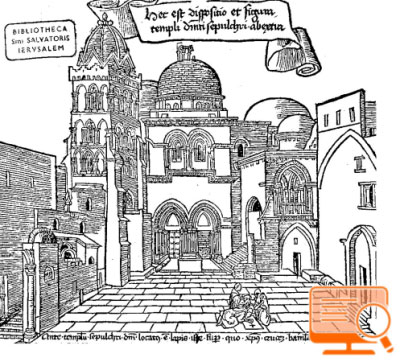The presentation of the Ancient Pilgrimage in Holy Land Digital Library (APHL Digital Library) was held on 19th April in the St Francis Room in St Saviour’s Convent in Jerusalem. This is the largest database in the world on printed travel literature in the Holy Land between the 15th and 18th centuries. The aim of the digital initiative, curated by Marco Callegari and Fabrizio Fossati, is to better value the itineraries and the travel diaries that are not only in the Libraries of Jerusalem, but also those accessible thanks to open access in the digital archives of all European libraries.
Dr Maddalena Baschirotto and Dr Marco Francalanci, collaborators of “Libri Ponti di Pace” supported by the Pro Terra Santa Association, presented this project – promoted by the General Library of the Custody of the Holy Land and supported by the European Research Centre on Books, Publishing and Librares (Centro di Ricerca Europeo Libro Editoria Biblioteca) directed by Prof. Edoardo Barbieri of the Catholic University of the Sacred Heart of Milan.
“The Digital Library is an updated and bibliographically accurate census of all the printed editions, between the 15th and the 18th centuries of texts on travel literature in the Holy Land,” explained Maddalena Baschirotto. “This database provides bibliographic records with meticulous descriptions and many digital reproductions (open access) of all the printed edition in the old collection of the libraries of the Custody (ITS collection), and in the main European libraries. Any scholar who is interested in travel itineraries from the spiritual, historical, anthropological, social, geographical etc. point of view can access this online resource (consultable both in English and Italian) on the site of the library, because it is from this library that the project started, considering the presence of the collection dedicated to this particular literary genre.”
The starting point for looking for the editions to include in the APHL Digital Library was the catalogue by Alessandro Tedesco “Itinera ad Loca Santa”, published in 2017, which in its turn had expanded, corrected and supplemented the two fundamental inventories Bibliographia geographica Palaestinae by Titus Tobler of 1867 and Bibliotheca geographica Palaestinae by Reinhold Röhricht of 1890.
“Here at the General Library of the Custody of the Holy Land, we have a precious collection of Itineraries in the Holy Land, of which the old collection was entirely catalogued by Dr Alessandro Tedesco in 2017,” underlined the Director of the General Library of St Saviour, fr. Lionel Goh. “Now, with the Digital Library, this treasure is at last accessible and used all over the world: it is a fundamental resource for all studies on the Holy Land, which is thus connected to materials and editions present in all the main European libraries. This ambitious project has been guided by three key words: accessibility to the editions, traceability and speed of use.”
“The Digital Library is a hybrid instrument, which embodies three ‘souls’,” continued Marco Francalanci, in a video link from Italy. “It is a catalogue, because it provides all the information on individual copies and the individual editions and with hypertext links. It is a bibliography, because it is complete with a bibliographic analysis, with references to each individual copy and it is also a library because users have at their disposal digital material to consult, exactly as in a library, so that they can examine and browse through the editions and the books belonging to this literary genre.”.
The online database allows five different search criteria for a thoroughly detailed consultation: author, title, publisher, place of publication and lastly an “innovative” instrument of its kind, namely the inclusion of a date or a period of time that allows identifying the travel itineraries published in that given period.
“Today’s conference is a providential coincidence,” said Prof. P. Rosario Pierri, Dean of the Studium Biblicum Franciscanum, “which is linked to the three days of conferences of the CABT, the theological and biblical course that the Studium organizes each year during the Easter week. This year’s topic was Jerusalem. The last lecture, expertly given by Prof. Eugenio Alliata, was on “The origins of the Christian pilgrimage to Jerusalem.” Alliata brought the attention of the students to the ancient accounts of pilgrimages to the Holy Land, dwelling in particular on the account by the pilgrim from Bordeaux, whose text clearly shows the existence in the Holy Land of a tradition of holy Christian places pre-existing the initiative of Queen Helena, the mother of Constantine. We hope that this project of the Ancient Pilgrimage in Holy Land Digital Library can boost historical studies, especially on the topic of the pilgrimage and allow serious, rigorous and scientific research.”
The project has also already been presented in recent weeks in Brescia, at the Catholic University of the Sacred Heart, at the Department of Mediterranean Studies of the University of Haifa and at the University of Tel Aviv, underlining how important this valuable instrument is to spread the bibliographic heritage on the history of the Holy Land and allow it to be used.
By Silvia Giuliano | custodia.org






